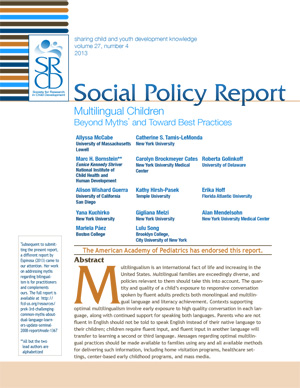
by Mariela Páez
Boston College
March 26, 2014

On October 2011, a group of scholars was brought together by Catherine S. Tamis-LeMonda for a Society for Research in Child Development (SRCD) Strategic Planning Conference entitled “Infants’ Learning of Multiple Languages: Development in Cultural Context.” The meeting was a success as presenters from all over the nation shared their research and insights regarding infant and children’s language development.
One of the themes across the conference presentations was the diverse experiences and multiple contexts that young children in the U.S. face in light of the demographic transformation of this country. We also discussed how the general public is not aware of many of the important findings from research regarding this diversity nor the implications of this research for language learning across different home, community, and school settings. This meeting was the impetus for the current SRCD Policy Report “Multilingual Children: Beyond Myths and Toward Best Practices.” Under the leadership of Allysa McCabe and Catherine S. Tamis-LeMonda, scholars in the field of early childhood and language development, the report addressed four important questions:
- What are the broad social and historical contexts of multilingual learners in the United States?
- What are the demographic characteristics of a multilingual family?
- Which, if any, language developmental processes and effective strategies for promoting monolingual children’s language can be applied to multilingual children?
- What home, education, and community contexts support learning multiple languages?
After reviewing the research evidence for these questions, the report presents implications and recommendations for policy and practice. The report highlights many essential messages that we need all professionals to understand when working with linguistically and culturally diverse families, including these:
- both the quality and quantify of input is important for language learning
- the need for parents to expose their children to rich linguistic environments—so they should speak the language in which they are proficient and that feel most comfortable speaking (also see “Should Families of English Language Learners Have an English-only Rule at Home?” by Nonie Lesaux)
- there is considerable evidence supporting maintaining the first language
- the positive effect of first language knowledge on, learning a second language
- the linguistic, cognitive, and cultural benefits that accrue from learning more than one language.
Perhaps as important and interesting as the report are the four commentaries included in the publication. Stephanie Curenton reminds, through an examination of rich cases of dialects in the Caribbean and African American populations, of the often forgotten fact that variation within any given language group may be as great as that between groups. In their own ways, both Lisa López and Michael López discuss issues of diversity and context, emphasizing the need for theoretically driven approaches to language policy and practice. In the last commentary, Diane August, reminds us that there is still much to be done with regards to research that can inform policy and practices that support multilingual children.
Read the full report here: http://www.srcd.org/sites/default/files/documents/E-News/spr_27_4.pdf.
This article is from the International Reading Association’s Literacy Research Panel. Reader response is welcomed. E-mail your comments to LRP@/.